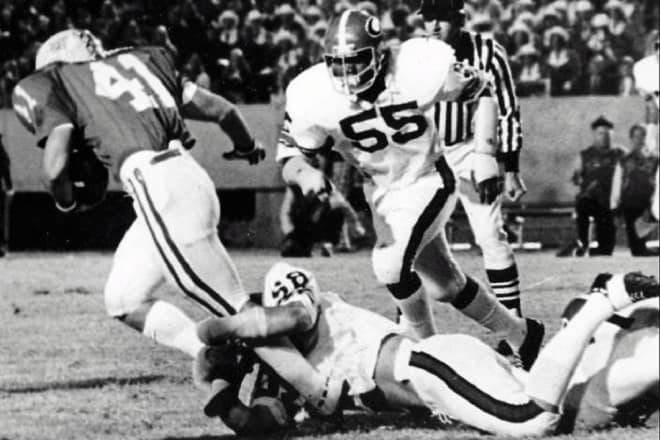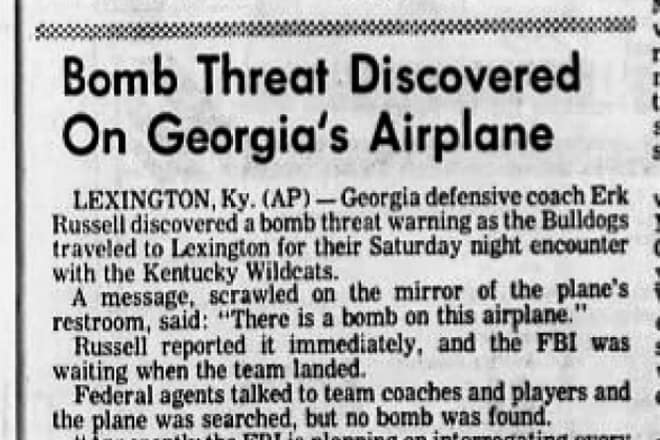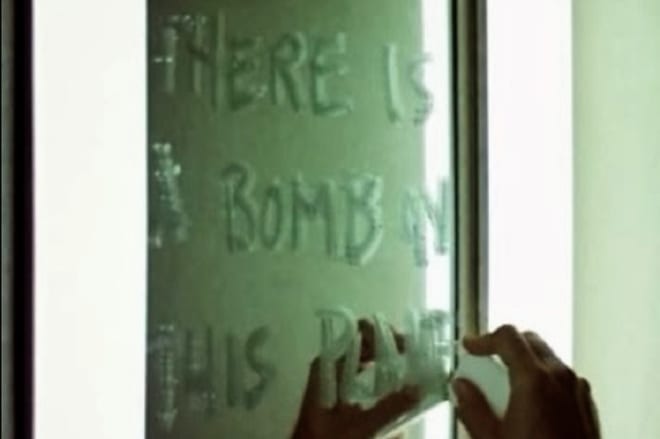A Bomb On This A-I-R-P-L-A-I-N
It’s Georgia-Kentucky week, which invariably reminds me of an extraordinary story regarding the Dawgs and ‘Cats—a true narrative, resulting 45 years ago, which has to rank among the greatest pranks in the history of college football.

Seeking its first victory on the road in the 1974 season, Georgia traveled to Lexington, Kentucky, in late October to face the Wildcats.
Normally, when the Bulldogs flew out of Atlanta, players had the option of riding a team bus from Athens to the airport, or simply driving over. Electing to drive before catching the team’s chartered night flight, a trio of Georgia players chose to drink several beers during their 85-mile trek to the Atlanta airport: two who wished to remain anonymous—we’ll call them “Chambers” and “Donaldson”—and sophomore Steve “Shag” Davis, a wideout dejected because he'd been demoted to second-string, and a careless individual just because he could be.
Once aboard the plane, the three players hastened to the back of the cabin for the bathroom, only to find a line had already formed for each of the two lavatories. After eventually relieving himself, Shag was on the way back to his seat when he was stopped by Bill Pace, Georgia’s offensive coordinator, who wanted to discuss a couple of new plays involving the receiver.
Eventually settling in his seat, Shag had relaxed for about 45 minutes, or about halfway into the flight, when suddenly, the captain’s voice unexpectedly came over the cabin speaker.
“Gentlemen, this is your captain speaking,” he began. “It has been brought to this flight’s attention that a bomb threat was written on one of the bathroom’s mirrors. We are guessing and hoping this is only a prank. If you are responsible for this, please come forward and you won’t get in nearly as much trouble than if you’re eventually found out. Thank you.”
The passengers sat in silence, most of them staring at one another—a stillness that essentially lasted the remainder of the flight. As the plane descended toward Lexington’s Blue Grass Field, one player looking out his window remarked that the ground was “lit up like a Christmas tree.” The runway was covered with as many as two dozen lighted emergency vehicles.
Once the plane landed and came to a stop, it was soon surrounded by at least 25 FBI agents, plus a bomb squad and local authorities. After searching under the vessel, the FBI boarded the plane, telling the team members to sit in their seats and not move. The agents milled about the cabin, gravitating toward the bathroom where the threat had apparently been written.
With no one having professed to the bomb threat, the players were marched from the plane into a room inside the airport, where they sat while authorities waited for a confession. After more than an hour of sitting and waiting, some players grew weary and antsy, including a senior team leader, who snapped.
“Come on, God dam***!” the player yelled at no one in particular. “Whoever did it, confess already! We’ve got to get to the stadium and practice tonight!” he declared, referring to the 30-minute mini-practice scheduled that evening.
Following what had been about three hours since the plane had landed, all the FBI agents curiously left the room together. After being gone for no more than 20 minutes, they returned as a group, as if they had just held a meeting, and promptly circled the players, who sat in chairs. Instantly, one of them, who appeared to be the head agent, made a peculiar announcement.
“Whoever wrote the bomb threat was a real dumba**!” the head agent said. “He spelled airplane, ‘a-i-r-p-l-a-i-n.’”
If the FBI agent was hoping to get some sort of reaction following his brash statement, he was very much misguided, as most of the players remained still, in absolute silence, and utterly confused. Without incriminating evidence or anyone confessing to the prank, it was soon determined that the FBI had no choice but to let the entire team go.

As Shag was about to board one of the team buses, which would not transport the players to their hotel until almost midnight, UGA football’s dorm counselor—we’ll call him “Kojak" (and for good reason)—approached him, highly agitated.
“Shag, I’ve got who wrote the threat narrowed down to about 10 people,” Kojak asserted, “and you’re one of them!”
Shag was scared, and he had been for hours—and for good reason. He was the one who had written the threat.
A few hours before, as Shag had been waiting to use the plane’s restroom, fellow receiver Dave Christianson got in line behind him. While using the bathroom, Shag recalled a scene from a movie he'd recently seen, The Parallax View. In the film, character Joe Frady, played by actor Warren Beatty, was in an airplane’s bathroom. He grabbed a bar of soap and wrote on the mirror, “THERE IS A BOMB ON THIS PLANE.” In an attempt to play a trick on Christianson, Shag used the bathroom’s bar of soap to write on the mirror something similar: “THERE IS A BOMB ON THIS AIRCRAFT.”
Still somewhat intoxicated as he exited the bathroom, coupled with being called over by Coach Pace, Shag did not notice that Christianson was no longer behind him in line, but instead had entered the other restroom when it became unoccupied. And, in talking with Coach Pace, Shag totally forgot his original intention of erasing the threat before the plane took off.
Instead of Christianson seeing the threat, or it being erased before takeoff, “THERE IS A BOMB ON THIS AIRCRAFT” was not detected until roughly forty minutes into the flight by assistant coach Erk Russell, who went from the bathroom straight to the cockpit to notify them of what he had spotted.
Any chance of Shag confessing to the prank vanished when the captain indicated that the confessor, although supposedly sustaining a lighter penalty, would still be in trouble. Having been arrested, dismissed from the team for a season, suspended and losing his starting role—all in the course of just over a year—Shag couldn’t afford to get into any trouble. If he confessed, he figured he'd be dismissed from the program permanently and perhaps even kicked out of school. He kept his mouth shut.
It turned out that the reason the FBI agents had left the room in the airport, only to return shortly thereafter, was that they indeed had held a brief meeting, agreeing that there was likely only one way they would get a confession: a mind trick of sorts.
Figuring the culprit—a young, cocky football player—had likely told a teammate about his prank, the FBI decided to insult the player by claiming that the “dumba**” had spelled “airplane” incorrectly. In reality, since he hadn’t even written the word “airplane,” much less misspelled it, the culprit would surely react somehow right in front of the agents’ watchful eyes, likely by maintaining to a teammate that he had actually scrawled “aircraft.”
But Shag had told no one of his prank, and wouldn’t for more than a year. The only reaction the agents perceived was one of silence and stillness.
The next night at Commonwealth Stadium, Shag was injured early in the game in what was perhaps poetic justice. He fractured his collarbone after several players—mostly his own teammates—fell on top of him as he attempted to block downfield on a running play. Shag would miss the next month of the season. As for the rest of the team, an exciting 24–20 victory over an adequate Kentucky squad was a continuation of one of the most inconsistent seasons in Georgia football history.

In late November/early December, while still nursing his fractured collarbone, an anxious Shag took most of his handful of trips to the main library while a UGA student, in a period of fewer than two weeks.
In nationwide newspaper accounts of the bomb threat, it had been reported that the FBI was “planning on interrogating every member of the Georgia football squad as well as the coaches,” including conducting handwriting analysis and lie detector tests. Studying up on how to beat such tests, Shag prepared himself for the FBI’s anticipated arrival in Athens.
However, by mid-January and with winter quarter having started, it was apparent the FBI’s claim that it would be converging on Athens to conduct handwriting analysis and lie detector tests was unfounded. Shag, who still hadn’t told anyone he had written the bomb threat, was extremely relieved—as was another Bulldog.
One night at a bar, Shag was approached by a teammate—a charmer, always the life of the party, who always seemed to have a story to tell. The two engaged in small talk before the teammate inquired, “Shag, you remember the bomb threat on the plane, right?”
How could Shag have forgotten? He answered, “Yeah, what of it?”
“Well, I know who did it—who wrote the threat on the mirror,” the teammate claimed in a near-whisper.
Nervously, Shag asked, “Who?”
“It was me, man! I was the one who did the bomb threat,” he lied in a boasting manner. “Can you believe I was able to pull that over on the FBI?”
No, Shag couldn’t believe it. Although the FBI’s trickery had failed to catch the culprit, it appeared to have been effective enough for the innocent to take credit for the misdeed.